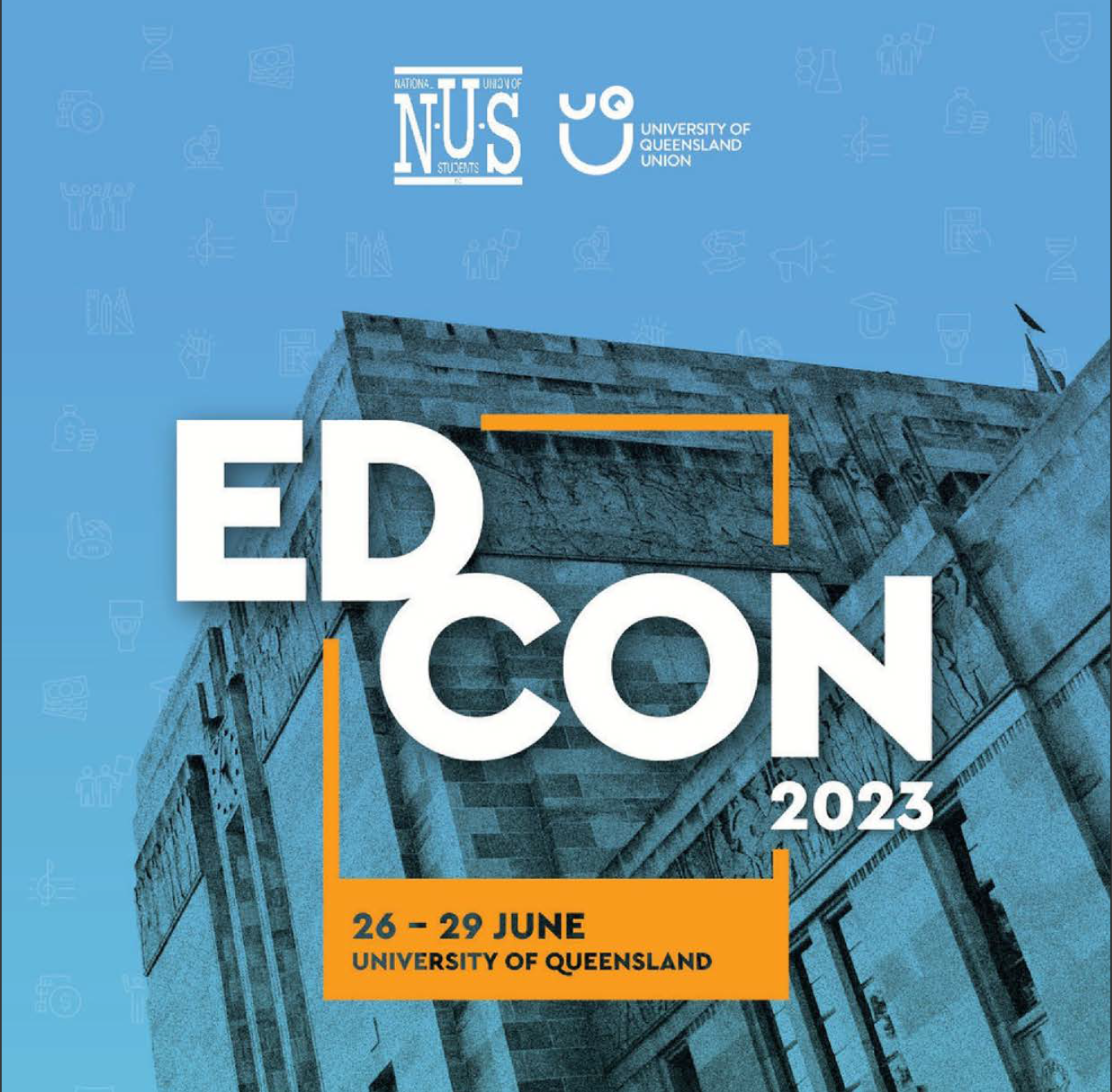 Welcome to the Tertangala’s second daily recap of Edcon 2023.
Welcome to the Tertangala’s second daily recap of Edcon 2023.
The Voice
The day began with a plenary on the upcoming voice referendum. The day started with Patrick Taylor, the NUS’ First Nation’s officer, addressing the conference about the efforts the NUS is taking in the Yes campaign.
Bailey Riley, the NUS President, said, “Everyone here needs to come together now as a student union and fight for something. You need to get out there.”
NUS Queer Officer Grace Hill spoke for SAlt, saying that the NUS should support the Yes vote and fight against the “racist No vote in this country.”
For a moment there appeared to be general consensus between the factions about the voice, and that the focus of the plenary would move towards mobilising students in the Yes campaign. But, as always, the yelling and fighting soon began. How naïve I was.
The main issue seemed to revolve around old question of how many prongs to include in student activism. There are only two prongs, much less than your average fork, but it generates a lot of debate within the NUS. Should the student union movement meet with government and university bosses to further its goals, and also protest out in the street? NLS answers yes and yes, a ‘two-pronged’ approach. Unity argues for more meetings and less protests, while SAlt demands more action in the streets.
Although the official line is vote yes, SAlt often says yes to protesting and no to working with the racist capitalist state, and this was the source of a lot of contention around the voice today. It seems many within SAlt see the Albanese government as arbitrators of institutional racism, by virtue of the fact that they “manage Australian capitalism in this country.”
“It’s amazing that we’ve somehow turned the one thing we all agree on into a fight,” said a dejected NLS member, poignantly.
A workshop on student campaigns for Yes was held after the plenary. There were four SAlt members present, and the majority of the session appeared to be NLS. Students shared the things they are doing to campaign for the referendum, but it also involved some analysis on the campaign so far and some sober assessments of the prospects of the referendum.
Sheldon Gait (Unity) said, “We have every major institution in the country backing us… We should be winning. Why aren’t we? Because we aren’t doing enough. I think we see more No stuff on Instagram than yes.” He and Bailey Riley agreed that the campaign had been botched from the start.
SAlt also chimed in with a (shockingly) measured assessment of the political landscape surrounding the referendum. Jasmine from SAlt argued that the problem, and the reason the referendum is doomed, is because the right-wing narrative surrounding the Voice has taken hold in society. This is because of the failure of Albanese and Labor to deal with Dutton’s arguments effectively, instead conceding too much ground to the No side. This series of concessions has effectively changed the trajectory of the Yes campaign to political capitulation to the no side.
I also attended a session run and populated by SAlt that addressed the issue of Indigenous youth crime. Things were different there. In some parts SAlt argued for liberation of indigenous people by abolishing youth detention, and that the NUS should devote its resources to fighting and protesting against racism (recall which prong SAlt favours). In other parts, I was informed, “Labor is actively overseeing the death and destruction of indigenous people and doing it with a smile.” NLS was present but drowned out.
A SAlt summed up the source of the discord today: “I’m never ever for consultation, that’s why I’m a f—ng socialist.”
Maybe consensus is a fictitious concept, made up by the capitalists to oppress us. A few of my student media colleagues took a bit of a break today.
How can we do better for queer students in the regions?
I also attended a workshop on queer issues in the regional context, hosted by Wollongong’s own Alec Hall, coordinator of this magazine, and Small and Regional Officer Cheyne Howard.
The workshop centred around the issues queer students face, queer advocacy in the regions, and the lack of support from the NUS. Alec and Cheyne argued queer collectives in the regions are fundamentally behind and can’t be expected to organise without external support. They said, “Queer students at regional universities are less privileged than those who attend metropolitan ones. It’s up to the NUS to keep fighting to bridge the gap and ensure we can keep fighting.”
Alec presented on ‘Operation Queer Space’, a protest by the Allsorts Queer Collective in 2004 to secure a safe and accessible queer space for UOW students.
It consisted of three stages: a petition and letter to university management, the occupation of the Vice-Chancellors building that lasted several days, and behind the scenes negotiation with the university. They also presented an honorary doctorate in homophobia to the Vice-Chancellor.
When the students occupied the vice-chancellors building, the electricity and water supply were cut off, and the police were called.
Eventually, two academics chose to vacate their offices to make the queer space happen.
Alec praised Operation Queer Space’s effectiveness in its two-pronged approach, but also emphasised this was an isolated exception in spontaneous student movements. “It relies on the brute will of people who aren’t even involved in the situation. That is not good enough.”
Cheyne also spoke on how students can support their queer peers. Allies can build their own awareness of their university’s queer collective (Allsorts Queer Collective for UOW), build support for queer students, advocate, and mobilise in support.
“We need to push. We need to reach out. Our national executive needs to reach out. It shouldn’t just be our regional cities. It needs to be UOW Bega.”
You can find more updates on the Tertangala’s socials.

